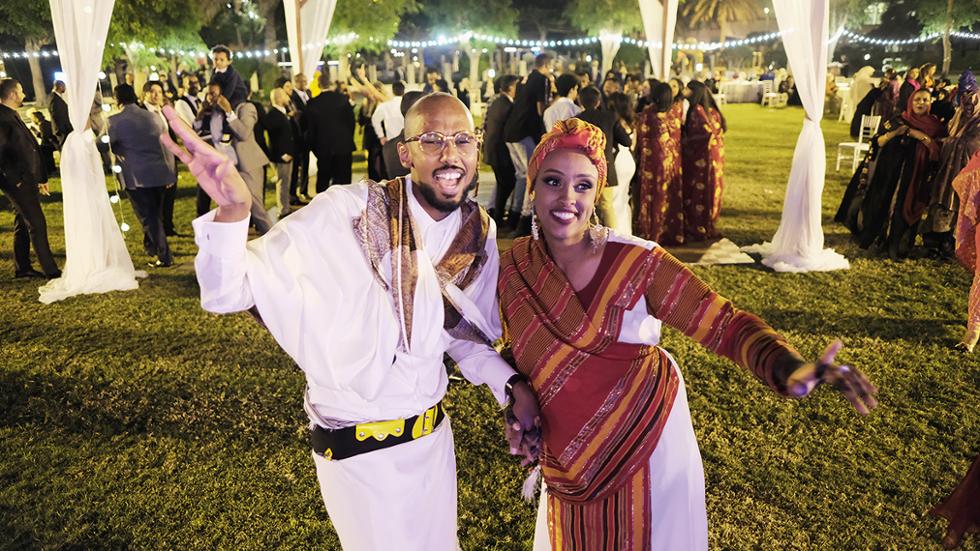The Somali culture is an amalgamation of traditions that were developed independently since the proto-Somali era. This came to light through interaction with neighboring and far away civilizations, which include other parts of Africa, the Arabian Peninsula, and Indian subcontinent. The resultant force of these blended cultures is evident in the way of life of Somalia, including their traditional wedding style.
Traditional attire of the Somali people is very different for both men and women. Primarily, the garb worn by these East Africans is influenced by some factors like religion, age, region, and the occasion the person is wearing clothes for. With Somalia being preponderantly an Islamic country, there is a strong influence of the faith on the code of dressing of the country.
In Somalia, the traditional dress worn is the macawis (ma'awiis), which is a sarong-like garment worn around the waist with a large cloth wrapped around the upper part of their body. On their heads, they usually wrap a colorful turban or wear the koofiyad, which is an embroidered taqiyah.
However, with respect to Somalia's proximity and close ties with the Arab world, many Somali men also wear the thawb or thobe (khamiis in Somali), a long white garment common among Muslims.
A thobe is an ankle-length attire, usually with long sleeves that is similar to a robe, kaftan, or tunic.

Although it is commonly worn in Arab countries and some countries in East and West Africa, but it is a typical traditional wedding dress in Somalia. On wearing this outfit, a sirwal or pants are normally worn underneath. Also, a thobe can sometimes be worn with a bisht. Originally made from Syria, Iraq, and Jordan, a bisht is representative of status of wealth and wealth as it is worn specially on occasions like traditional wedding ceremonies.
Furthermore, the traditional Somali attire for men is composed of two sheets (often plain white), as one is being draped over the shoulder and the other tied around the waist. The sheet sometimes are embroidered with patterns or laced borders.
_______________________________________________________________________
Read about:
Kitenge Church Dress For Ladies
Traditional Wedding Styles In São Tomé And Principe
_______________________________________________________________________
Somali women are always the lady of the hour at their traditional weddings with beautiful fashion statements to behold. Across the country, dirac is worn for special events, like the Somali wedding. The dirac is a long, light, diaphanous voile dress made of cotton or polyester fabric. It is often worn over a full-length half-slip and a brassiere. Referred to as the gorgorad, the underskirt is made out of silk and serves as a key feature of the overall outfit. The dirac is usually bight and very colorful, with the most popular styles being those with gilded borders or threads. This fabric is typically acquired from Somali clothing stores in tandem with the gorgorad. Although baati is also worn in some cases, but there is a conservation for that. A baati is a long dress-like wear that is made out of comfortable polyester. There are many different designs of this garment varying from region to region.
The gorgeousness of Somali women is incomplete without the cladded touch of a shawl. A shawl is an Indian simple item of fabric loosely worn over the shoulders, upper body and arms, and sometimes also over the head. A shawl is usually a rectangular or square piece of cloth, which can also be folded to make a triangle, Its other varying shapes can be in triangular or other shapes that include oblong shawls.
The essence of these shawls are to keep warm and to complement a costume for many symbolic reasons. Its floral design appears in a heavy, close embroidery-like weave in dull silk or soft pashmina, meaning woolen. Meanwhile, it usually comprises small or large flowers delicately sprayed and combined; some shawls do have net-like patterns with floral ensemble motifs in them.

Across Somalia, the culture in most cases blend shawls of various types into their national folk dress, mainly because the relatively unstructured shawls were much more commonly used in earlier times.
The Kashmir shawl is typical of elaborate designs, in which the "cone" pattern is a prominent feature, and by the glowing harmony, brilliance, depth, and enduring qualities of its colors.
Interestingly, Somali women have a long tradition of wearing gold and silver jewelry, especially bangles. At traditional weddings, the bride is always adorned in gold. By tradition, many Somali women do also wear gold necklaces and anklets. The xirsi, an Islamic necklace likewise donned in Ethiopia and Yemen, is often worn.






















Leave a comment